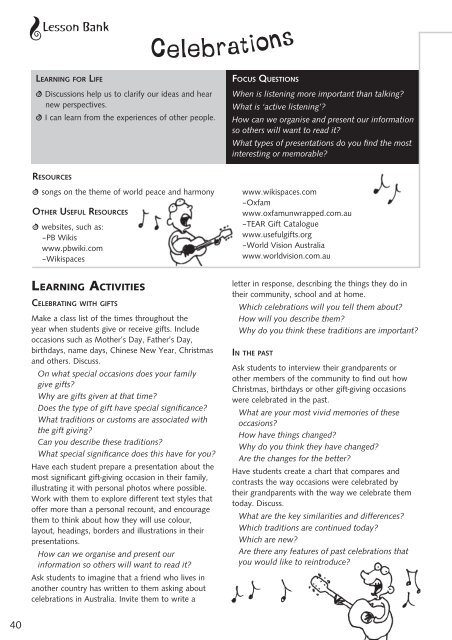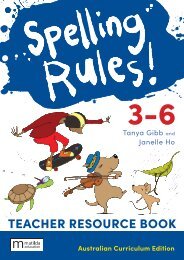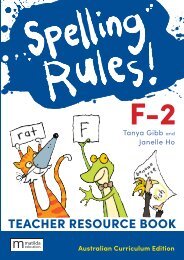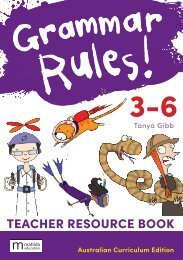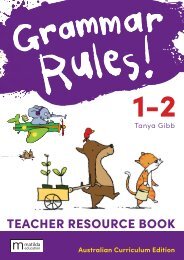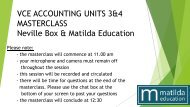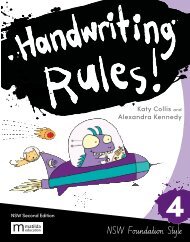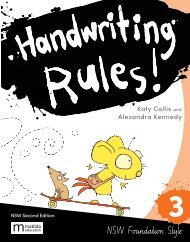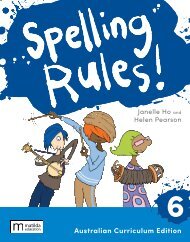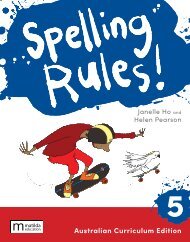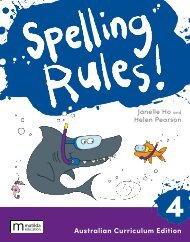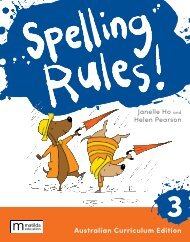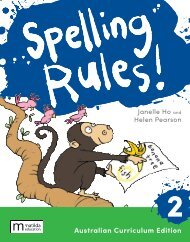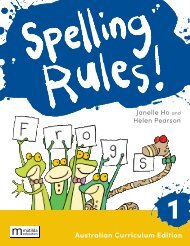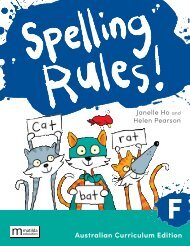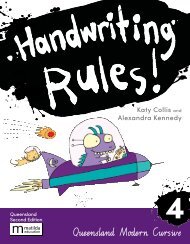All You Need to Teach - Info Literacy 10+
You also want an ePaper? Increase the reach of your titles
YUMPU automatically turns print PDFs into web optimized ePapers that Google loves.
Lesson Bank<br />
Celebrations<br />
Learning for Life<br />
V Discussions help us <strong>to</strong> clarify our ideas and hear<br />
new perspectives.<br />
V I can learn from the experiences of other people.<br />
Focus Questions<br />
When is listening more important than talking?<br />
What is ‘active listening’?<br />
How can we organise and present our information<br />
so others will want <strong>to</strong> read it?<br />
What types of presentations do you find the most<br />
interesting or memorable?<br />
Resources<br />
V songs on the theme of world peace and harmony<br />
Other Useful Resources<br />
V websites, such as:<br />
–PB Wikis<br />
www.pbwiki.com<br />
–Wikispaces<br />
www.wikispaces.com<br />
–Oxfam<br />
www.oxfamunwrapped.com.au<br />
–TEAR Gift Catalogue<br />
www.usefulgifts.org<br />
–World Vision Australia<br />
www.worldvision.com.au<br />
Learning Activities<br />
Celebrating with gifts<br />
Make a class list of the times throughout the<br />
year when students give or receive gifts. Include<br />
occasions such as Mother’s Day, Father’s Day,<br />
birthdays, name days, Chinese New Year, Christmas<br />
and others. Discuss.<br />
On what special occasions does your family<br />
give gifts?<br />
Why are gifts given at that time?<br />
Does the type of gift have special significance?<br />
What traditions or cus<strong>to</strong>ms are associated with<br />
the gift giving?<br />
Can you describe these traditions?<br />
What special significance does this have for you?<br />
Have each student prepare a presentation about the<br />
most significant gift-giving occasion in their family,<br />
illustrating it with personal pho<strong>to</strong>s where possible.<br />
Work with them <strong>to</strong> explore different text styles that<br />
offer more than a personal recount, and encourage<br />
them <strong>to</strong> think about how they will use colour,<br />
layout, headings, borders and illustrations in their<br />
presentations.<br />
How can we organise and present our<br />
information so others will want <strong>to</strong> read it?<br />
Ask students <strong>to</strong> imagine that a friend who lives in<br />
another country has written <strong>to</strong> them asking about<br />
celebrations in Australia. Invite them <strong>to</strong> write a<br />
letter in response, describing the things they do in<br />
their community, school and at home.<br />
Which celebrations will you tell them about?<br />
How will you describe them?<br />
Why do you think these traditions are important?<br />
In the past<br />
Ask students <strong>to</strong> interview their grandparents or<br />
other members of the community <strong>to</strong> find out how<br />
Christmas, birthdays or other gift-giving occasions<br />
were celebrated in the past.<br />
What are your most vivid memories of these<br />
occasions?<br />
How have things changed?<br />
Why do you think they have changed?<br />
Are the changes for the better?<br />
Have students create a chart that compares and<br />
contrasts the way occasions were celebrated by<br />
their grandparents with the way we celebrate them<br />
<strong>to</strong>day. Discuss.<br />
What are the key similarities and differences?<br />
Which traditions are continued <strong>to</strong>day?<br />
Which are new?<br />
Are there any features of past celebrations that<br />
you would like <strong>to</strong> reintroduce?<br />
40


